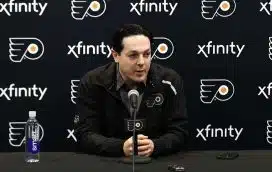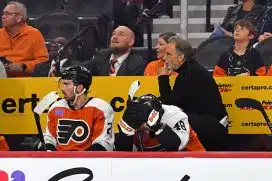By Kevin Durso, Sports Talk Philly editor
The Flyers certainly made things interesting with a Game 5 win and a 4-2 lead midway through Game 6, but the Pittsburgh Penguins ultimately proved to be too overpowering for the Orange and Black.
It’s not the result of the series, but the areas within a game where the Flyers showed their insufficiencies and the Penguins showed their experience that proved to be the bigger downfall.
The Flyers seemingly defied some odds in making the playoffs. They had a 10-game losing streak in November that suggested this team wasn’t playoff material. The thought was similar entering the season.
Well, they made it, the last team to clinch a playoff spot in the East. Despite what the standings showed, which was a third-place finish in the Metropolitan Division, the Flyers are not a team ready to run with the league’s elite team. Not even close by the Penguins standards.
With the season and a rather one-sided playoff series in the books, time for some evaluation from the Flyers at all levels.
For Ron Hextall, Start Building This Team Out
This Flyers team had its ups and downs. There was the low of a 10-game losing streak. There was the high of a tremendous month of February and a handful of days in first place in the Metropolitan Division.
Ultimately, the Flyers don’t have the roster makeup to be among the top teams in the division and East, but also shouldn’t be a team that is squeezing into the playoffs on the final day of the regular season.
This is where the offseason gets critical for Ron Hextall.
It’s time for the Flyers to start building a contender and speeding up the process. That happens in two ways.
First, the Flyers can’t stray from adding young players. Last season, it was Ivan Provorov and Travis Konecny. This season, it was Nolan Patrick, Robert Hagg, Travis Sanheim and Oskar Lindblom. Next season, there needs to be even more. Guys like Sam Morin, Mike Vecchione, Nicolas Aube-Kubel and Phil Myers need to be on the radar. And who knows if another prospect, say Morgan Frost or German Rubtsov or somebody of that nature, proves to have a tremendous camp and earns a roster spot.
However it happens, don’t stop the youth movement.
But don’t overlook the importance of veteran presence either. That said, veteran presence needs to be redefined to a degree.
There’s no question the Flyers had veteran presence. But when your veteran presence is also proving to be a liability within a game, it’s setting the team back.
The Flyers have proven to be capable of stringing together wins and making the playoffs. Now is the time to put the retooling, rebuilding, whatever you want to call it into another gear. If a significant upgrade can be made via trade, explore it. If a free agent is worth the cost, go for it.
For the last three years, the blueprint has been strictly through internal building. It’s time to explore all avenues for improvement while letting some of the liabilities and dead weight walk.
For Dave Hakstol, Learn to Adjust
Dave Hakstol can’t make the players play better at the drop of a hat. He’s not responsible for mismanaging the puck and failed clears and turnovers.
But, he got outcoached in the series because the Flyers have struggled to put together a gameplan and stick to it and struggle to adjust within the game.
The Penguins series put all of that on full display. Mike Sullivan had a gameplan. Attack the Flyers defensemen and force turnovers. They did. It worked.
When something didn’t work in a game Pittsburgh lost in the series or things were taking a turn, they adjusted to what the Flyers were doing. If that meant putting the focus on neutral zone play or a special teams adjustment or in-game line shuffling for better matchups, Pittsburgh did it.
The Flyers had two really good opening periods on home ice in the series — Game 3 and Game 6. In both, they came out physical and throwing a lot of contact at the Penguins, throwing them off their game a bit.
The Flyers trailed 1-0 after the first period of Game 3 and were tied 2-2 after the first period of Game 6. It seemed like when the Flyers did a lot of little things right but didn’t get the results, they would abandon the strategy too quickly.
Hakstol still makes questionable lineup decisions. Special teams is a disaster and needs to be addressed, and it isn’t just personnel. You can’t implement a special teams mindset that involves setting up the perfect play or being too passive.
Playing passive is a big part of the problem. The Flyers got 24 regular-season games to overtime this season. Hakstol looked at the 98 points this season as a sign of growth. To a degree, he’s not wrong.
That said, when the playoffs start, overtime is different. You don’t play to force overtime in the hopes that you don’t lose and get nothing to show for it. A loss in the playoffs counts the same whether it comes in overtime or regulation.
Far too often, the Flyers played not to lose in the third period of games instead to win. It happened a lot during the 10-game losing streak. It happened often again down the stretch of the season. And while the Flyers won a lot of games to get to 98 points as well, they played a total of 88 games between the regular season and playoffs and won the exact amount they lost, an even 44 wins to 44 losses.
The teams that are still alive in the playoff picture today are there because they play with a much more aggressive style. They don’t rest on teams that sit below them in the standings. They elevate their game against the elite teams. It’s what the best teams in the league do.
The Flyers got better in a lot of areas — better record on the road, better against tougher competition (aside from Pittsburgh) — but they still have too many games and periods within games where everything falls apart. That is as much on a coaching staff as it is the players. Making adjustments from game-to-game and within a game can prevent a lot of the shortcomings the Flyers have.
For the Players, Become More Consistent
It’s difficult to evaluate this completely because this is the one area of a team that is most subject to change. There’s going to be a lot of it for this group.
There are five players who have contracts coming off the books and the expectation is they won’t be re-signed. There are potential buy-out candidates to open up cap and roster space. The team may start to get aggressive and explore trades. Free agents will changes the makeup of the roster.
You can expect a very different roster next season.
That said, you can also expect a lot of the core to be back in place. Claude Giroux, Jake Voracek, Sean Couturier, Nolan Patrick, Shayne Gostisbehere, Provorov, Konecny — those guys aren’t going anywhere.
Those players aren’t always the reason the Flyers struggle to find consistency, but as leaders of the team, they have to try to help prevent it.
From a player’s perspective, the area where the Flyers need to improve can’t be addressed during the offseason, but after it is complete and the new season prepares to begin. The Flyers need to become a more consistent team.
As much as the GM can build a better roster and the coach can implement better strategy, systems and adjustments within a game, the players are the ones who go about the actual execution of a gameplan.
Too passive on a power play? The players have to shoot more.
Poor coverage defensively or too many turnovers? That’s on the players to clean it up and communicate better.
Need a stop from your goaltender? That's on him to make it.
Coaches can help in these areas, but the players have to put it into action and make it happen. More than actually making it happen, the players need to do it more consistently.
Winning exactly half of the games played in a season is the definition of mediocrity. That still amounts to a playoff appearance and a six-game series that looks closer by the box score than it was on the ice.
The overall team goal needs to be this: make the playoffs comfortably and win a playoff series. Anything short of that is not progress at this point.
The Flyers have made the playoffs twice under Dave Hakstol. Both times, it took until the final weekend of the regular season to lock up a spot. That was followed by two six-game series and first-round elimination.
That was fine in the first season of a new coach and a GM still working on building a winning roster. To do it three times in four seasons is unacceptable. The Flyers need to be locked into the playoffs much earlier and need to be more competitive in a playoff series to the point where they don’t enter as massive underdogs.
For all the ups and downs of the season, it was a solid sign of progress. The task now is to take that progress and do the necessary things in the offseason to move the process forward as the Flyers build a contender.
It will be a long offseason, but it should be a busy one for the Flyers ahead of another season in the quest to return among the NHL’s elite.







